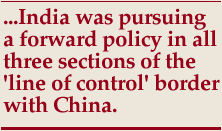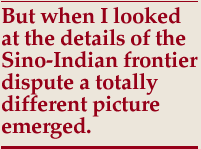The Rediff Special/Dr Gregory Clark

 The Sino-Indian frontier dispute of 1962 was a key part of my education in foreign affairs, even though I was largely a bystander.
The Sino-Indian frontier dispute of 1962 was a key part of my education in foreign affairs, even though I was largely a bystander.
If I relate the details now, 40 years later, that is partly because they remain important in themselves. But even more importantly, they are also crucial to understanding the lying and duplicitous nature of Western foreign policies during the Cold War years.
For much of 1962 I was the official directly in charge of Chinese affairs within the East Asia division of Australia's former department of external affairs. As a Chinese language speaker, I had previously been stationed in Hong Kong as second secretary for two years.
At the time it was obvious that India was pursuing a forward policy in all three sections of the 'line of control' border with China. Posts and patrols were being pushed further and further into territory that seemed clearly to lie on the Chinese side of that border.
Beijing was warning heavily that if the pressure continued, inevitably there would be conflict. I decided to look much more closely at the claims both sides were making to disputed territory.
At the time, in any dispute involving China, Canberra's usual assumption was that Beijing was in the wrong. China had been labelled an aggressor in the 1950-53 Korean War. Taiwan was still a hot issue at the time, with China once again seen as an aggressor following the very dangerous 1958 Taiwan Straits crisis involving the offshore islands of Quemoy and Matsu (the civil war nature of Beijing's dispute with Taiwan had conveniently been forgotten).
1959 saw Beijing's suppression of the Tibetan uprising. By 1962 the Sino-Soviet dispute was underway, with Beijing firmly seen as seeking to follow a much more anti-Western and harsher ideological line than Moscow. None of us realised then what I later worked out to be the key cause of the dispute, namely Khrushchev's withdrawal of the Soviet nuclear umbrella from China during the Taiwan Straits dispute.
All this combined with events along the Sino-Indian border served to create in the West the image of an aggressive China already on the move and out of control.
But when I began to look at the details of the Sino-Indian frontier dispute a totally different picture emerged.
 In the NEFA, China seemed tacitly to have accepted the Indian claim and the fact of Indian occupation, even though this meant the loss of a very large and valuable territory populated by Mongoloid people and which in the past had clearly belonged to Tibet. It had come into Indian hands only as a result of British expansionism during China's period of historical weakness, a fact firmly suggested by the very name of the frontier Beijing had tacitly accepted as the line of control --- the McMahon Line.
In the NEFA, China seemed tacitly to have accepted the Indian claim and the fact of Indian occupation, even though this meant the loss of a very large and valuable territory populated by Mongoloid people and which in the past had clearly belonged to Tibet. It had come into Indian hands only as a result of British expansionism during China's period of historical weakness, a fact firmly suggested by the very name of the frontier Beijing had tacitly accepted as the line of control --- the McMahon Line.
In the central sector there seemed to be little to contradict Chinese claims to the small pockets of territory being contested. In the western Aksai Chin sector the Chinese claim seemed overwhelming --- the facts that most of the land lay on the Chinese side of the watershed, that China had built a badly needed road to connect Tibet with Sinkiang through the barren landscape without New Delhi even realising it, and that the population even on the Indian (Ladakh) side of the 'line of control' border was Mongoloid and Tibetan Buddhist.
When thanks to Alastair Lamb's important book, The China-India Border, I discovered that the Indian claim was based on serious distortions of 19th century British-Chinese documents, I was amazed by the seeming vehemence of New Delhi's very weak claim to the territory. (Distribution of Lamb's book was banned in India at the time.)
Even more disturbing was New Delhi's demand that China evacuate the entire territory before there could be serious border talks.
In short, it was obvious that Beijing was preparing for a very reasonable compromise settlement to the frontier dispute, namely giving up the NEFA claim in exchange for India accepting China's Aksai Chin claim.
This would leave India in control of by far the most valuable piece of territory, namely the NEFA. That India seemed to want to reject this very generous solution seemed most unreasonable. The Nationalist government in Taiwan was already criticising Beijing for being willing to abandon historical Chinese territory in the NEFA.
Gradually I began to realise that the entire dispute had to be seen in the context not of border rights and wrongs, but rather of Nehru's anger over loss of an Indian presence in Tibet after the establishment of the Communist regime in China and particularly after 1959. He seemed to believe that somehow the situation could be reversed by continued pressure on China.
At the time the details of how India had co-operated with the CIA in helping foment the 1959 Tibetan uprising were not known. But Beijing was already providing good evidence of Indian involvement. In short, and even without looking at the facts on the ground, it was very likely that New Delhi, not Beijing, was instigating border tension.
 A key piece of evidence showing that Beijing was not trying to be aggressive along the border was the so-called Tibetan Documents --- material captured from a Chinese frontier post in mid-1962 and smuggled out to the West via Washington. Careful reading of the documents made it clear that Beijing was very concerned about Indian policies over Tibet, and warned Chinese officials constantly about the danger of Indian provocations.
A key piece of evidence showing that Beijing was not trying to be aggressive along the border was the so-called Tibetan Documents --- material captured from a Chinese frontier post in mid-1962 and smuggled out to the West via Washington. Careful reading of the documents made it clear that Beijing was very concerned about Indian policies over Tibet, and warned Chinese officials constantly about the danger of Indian provocations.
In other words, China was clearly on the defensive. But none of the people around me at the time seemed very interested in this kind of reliable inside evidence of Chinese thinking. They had already decided that Beijing was aggressive, and that was that.
When serious fighting broke out on October 20 as Chinese troops moved south across the Thag La Ridge area following Nehru's October 12 order to have Indian troops occupy the Dho La Strip territory, I made it my job immediately to check where the disputed Dho La Strip territory was actually located. Extremely detailed and seemingly objective material coming out of Beijing, including copies of the original McMahon Line agreement, complete with maps, seemed to confirm that both the Dho La Strip and the Thag La Ridge were indeed north of where the McMahon Line was supposed to be. In which case, India was clearly the aggressor.
I sent cables to our offices in London and Washington with instructions to find out whether British and US intelligence confirmed my conclusions about the location of the strip and Indian activities there. A day or two later, probably around October 24, very guarded replies came back from relevant officials saying in effect that my conclusions were not inaccurate.
What to do? Already London, Washington, and Canberra were coming out with strident condemnations of Chinese aggression against peaceful India. Many were already saying how this was the first stage in a Chinese thrust through to the Bay of Bengal. Canberra had even announced that it would supply weapons to help peace-loving India resist the Chinese aggressors.
 I decided to send up a submission to my superiors saying that Indian claims of unprovoked aggression from China were not quite as strong as most believed, and that Canberra's rushed offer to supply weapons should at least be conditional on a New Delhi promise to negotiate the frontier in a more serious manner.
I decided to send up a submission to my superiors saying that Indian claims of unprovoked aggression from China were not quite as strong as most believed, and that Canberra's rushed offer to supply weapons should at least be conditional on a New Delhi promise to negotiate the frontier in a more serious manner.
My two immediate superiors accepted the submission, despite their normally rather hawkish views. But it came to a dead stop in the hands of the then division head, David Anderson, later to be Australia's ambassador to Saigon.
In the margin he had scrawled: "I fail to see that it is not in the Australian interest to see the Chinese and the Indians at each other's throats."
For me, this was the ultimate example of the ugly Cold War realpolitik that was to lead eventually to the mess that Anderson was to confront later in Vietnam. From then on there was little more I could do, other than contemplate cynically Canberra's puzzlement when the Chinese 'aggressors' failed to press on to the Bay of Bengal and in fact returned to precisely where they had started, without even trying to seize some of the NEFA.
Later, I resigned from external affairs in 1965 and became involved in the anti-Vietnam War protest movement. At the time the myth of an 'expansionist' China, with heavy emphasis on the 1962 Sino-Indian dispute, was being used constantly to justify Western, including Australian, intervention in Indochina. The only answer, it seemed, was for me to try to write a detailed book on China, pointing out the not unreasonable nature of Beijing's foreign policies.
A key element in rebutting the 'China as Asian aggressor' image would be a chapter giving full details of everything I knew about the 1962 Sino-Indian dispute. Other chapters would discuss the Sino-Soviet dispute (where I had already worked out the Taiwan connection), the civil war nature of the Taiwan dispute, and Tibet's role in the Sino-Indian dispute plus the fact that Tibet has always been seen as Chinese territory.
During a 1963-5 Moscow posting I had got to know India's top China expert, also posted there at the time, and he had confirmed my feeling that Tibet was indeed the key to Nehru's aggressive frontier policies.
 The book, In Fear of China, finally appeared in 1968. I had assumed naively that the detailed research I had done with so much effort on the Sino-Indian dispute would be widely read and would awaken world opinion to the facts.
The book, In Fear of China, finally appeared in 1968. I had assumed naively that the detailed research I had done with so much effort on the Sino-Indian dispute would be widely read and would awaken world opinion to the facts.
But publication had not been easy. At the time I was supposed to be studying the Japanese economy full-time at the Australian National University. I had reluctantly been given a mere six months to go off and write the book. The ANU Press, which earlier had promised to publish the book, rejected it on the advice of the then heavily pro-government foreign policy International Relations Department (it was also heavily infiltrated by intelligence people determined to keep dangerous anti-government policy academics like myself at bay).
Melbourne University Press also withdrew a promise to publish (its head was later shown also to be closely involved with Australia's intelligence establishment).
Eventually I found a commercial Australian publisher --- the Lansdowne Press. But its weak overseas connections meant the book, and the all-important Sino-Indian chapter, could easily be ignored by the then ultra-hawkish US and UK foreign policy establishments. The China Quarterly, then the main journal on Chinese affairs and at the time edited by later UK governor in Hong Kong David Wilson, and which earlier had published much supporting the Indian case over the border dispute, managed dismissively to review my book in a single paragraph.
It was not until publication of Neville Maxwell's very important book, India's China War, in 1972 that the facts could no longer be ignored. But by that time it was too late. As Henry Kissinger is reported to have said at the time, if he had known the facts of the dispute earlier, his image of Beijing as inherently aggressive would have weakened, together with his support for US intervention in Indochina.
Former US secretary for defence Robert McNamara has also confirmed that the Washington view of China as aggressive was the key factor behind that intervention, with its three million deaths in Vietnam plus another million or so deaths elsewhere in Indochina.
And to think that it all began at that remote Dho La Strip, and that the inability of people like myself to get the facts out was at least partly responsible for the subsequent tragedy....
(Gregory Clark is a former Australian diplomat and now honorary president, Tama University, Tokyo)
